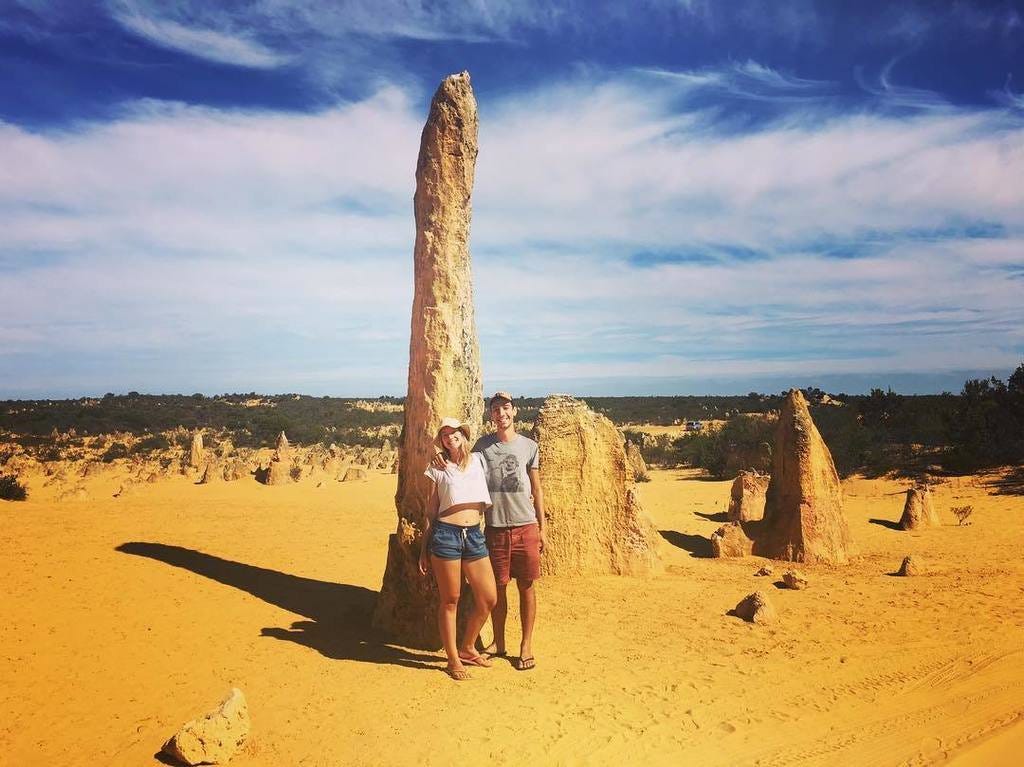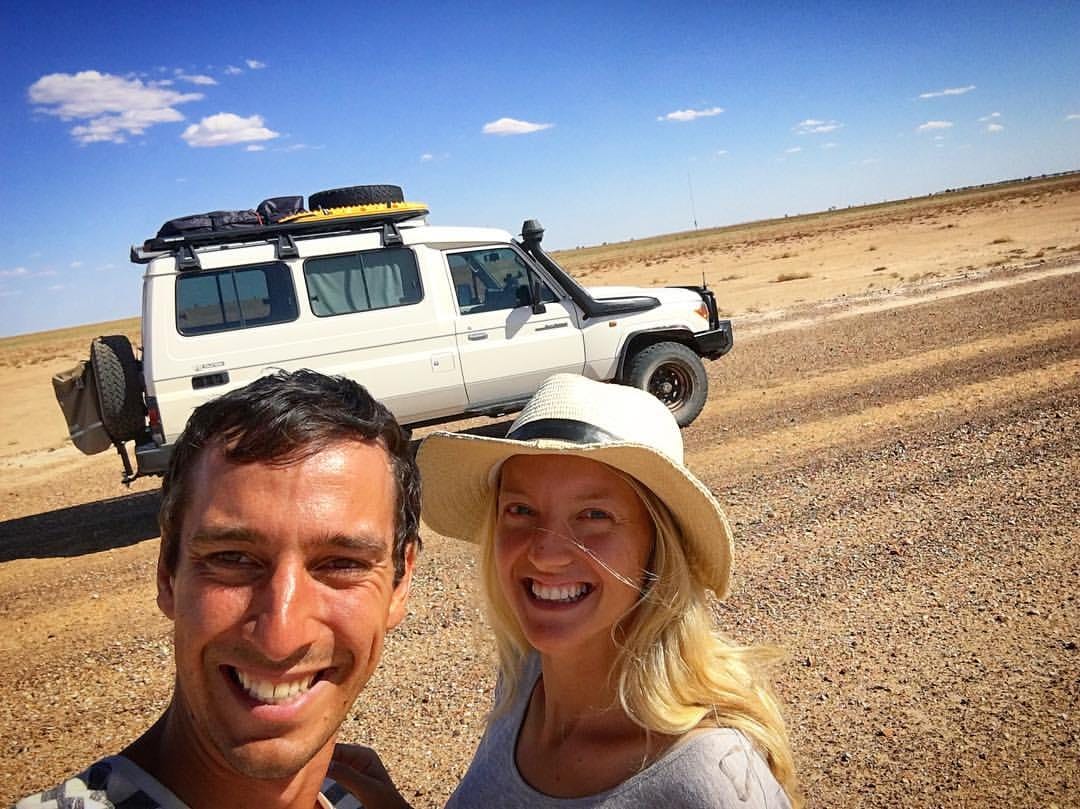My name is Sandra Arato, and together with my partner Peter we are bootstrapping a company called Curiosat. We are both developers, and though we are originally from Hungary we have lived and worked around the world in the last few years: in Sydney, New York and London, among others.
When we decided to move back to Australia in 2014, we knew we would like to start our new life here with a Big Lap around the country. As soon as we arrived in August 2016, we bought a Toyota Landcruiser and fitted out its rear to serve as a camper-van for a long-term trip. We started in September from Sydney and covered around 4–5000kms each month. With all the beautiful places and great experiences we had an amazing life in the Troopy, but after 6 months of travelling, I started missing city life and my connection to technology.

Peter came up with an idea to attend a hackathon to cheer me up. On our way to Perth we searched for upcoming events and found the NASA SpaceApps Challenge — the worlds largest hackathon with over 25000 participants across 187 locations around the globe all on the same weekend. Within 48 hours we had to solve one of the predefined challenges that our planet faces with a team we formed a day before the event.
We chose to create a tool that tracks energy consumption in a household and promotes the use of solar energy. With a team effort, we came up as one of the winners of the local round. We were thrilled to find out that our idea and the first place qualified us to participate in the Gemini Space Entrepreneurship Incubator too, organised by MoonshotX.
There was one little catch though: we were aiming to stay connected to the program while travelling full-time through Australia’s most remote places.
In the first few weeks of Gemini, we learnt about the structure and milestones of the program. We had a weekly hangout every Thursday, and we were required to make a video update about our progress each week. We had a chance to communicate with different mentors every week and ask them questions or talk about our recent issues one-on-one. The aim of the program was to make us investor-ready by the end of the program, which is quite a lot to go for in 12 weeks, I thought.
I have been thinking about starting my own company for a while but didn’t know the right way to do so. As a technical person, I believed that one day a great idea or opportunity will show itself, and I will find my non-technical counterpart who helps me with the business side of things — that’s how I will launch my own business. Since we had the chance to participate in Gemini I thought this would be a great opportunity to start learning about the parts I did not know much about and to see where that leads me in my entrepreneurial journey. From Day 1 my purpose was to learn as much as I could through the program, and believe that the knowledge I pick up would be useful in some way.

From week to week, as we travelled from Perth to the Kimberley, then through the Northern Territory and Central Queensland, each Thursday we would stop somewhere with mobile coverage and join the weekly Gemini session with the other participants via Google Hangouts. During each session, we would learn about a new topic from the experience of the weekly special guest presenter, see the others in the program, and see what progress they’d made in the last week. Sometimes this meant driving extra hours or staying extra days in towns with no benefits except for the mobile coverage. We used our mobile data plans to do this as there was no other way to connect to the internet. Each week, we learned more and we gained new ideas for our tool-set to understand our potential customers.
We had to be creative as the population density is quite low in the outback, and it’s literally impossible to reach some of the people who have no internet, no phones and only a post box they check every 2–3 weeks. So other than driving hundreds of kilometres to talk to 1 or 2 people in our current target customer segment, we decided to try our MVP at a town market in Kununurra, Western Australia. We offered free ginger beer for customer interviews and talked to many amazing people! Our MVP failed spectacularly, but attending the market proved that we understood how our potential customers would behave and what kind of channels would work for them.

After our experience at the Kununurra market, we decided to pivot and look for a better problem for us to solve. We knew that we want to stick to our vision, which is to explore new and exciting insights about the space around us and ask questions that have not been asked before. We also realised that if we decide to build a startup from scratch, with all the unknown details, we want to start with an area we have confidence in. We decided to find a problem in travel and tourism. By this time we had been on the road for 9 months. We knew we had a very unique and fresh insight about the Australian travel market and we wanted to use that to our advantage.
In the last weeks of the program, we set out a new problem to tackle: gathering visitor information from National Parks and other remote areas. We knew from experience how challenging it is to pay for a campsite in a National Park without reception, and after several customer interviews, we also realised that rangers and park management had issues with collecting payments and monitoring campsite activity. We thought of using high-resolution satellite imagery to capture the number of campers in remote bush camps, but as we moved along with different iterations and talked to some of our mentors we realised there were other options as well, which are a lot more suitable for our use case.

At the end of the program, we have a problem to solve in an area we feel comfortable with and an MVP to test. We now have the tools to take our plans and ambition to build a business around us, and we know we are flexible enough to accommodate for upcoming challenges. We have selected the best location to validate our product-market fit — Queensland — and after 12 weeks of the pilot Gemini program we are figuring out our way to the next exciting section of our life: turning the MVP to a business. We are still exploring our possibilities and ways to learn more and more: accelerators, bootstrapping and professional networking events are all on our radar.
I believe the Gemini program gave us the ability to achieve a product-market fit. While our MVPs can fail many times, now we know how to learn from them, to keep iterating on new discoveries and come up with new ideas. As a founder, I advise every single person who believes he/she only has part of the puzzle to complete a business to apply to the Gemini program where one can learn how, or be connected with people who can, fill the gaps.
Thank you again, MoonshotX, for giving me and the team the opportunity to learn and evolve through the program, help us aim high and discover that only the sky is the limit.
Applications are open for the next round of Gemini for participants across Australia, Singapore, New Zealand, the USA and Canada. Apply now!

